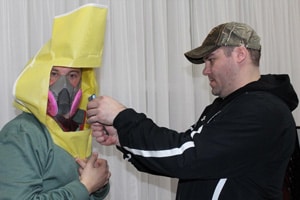MARCH 2019
 Natalie Hoidal
Natalie Hoidal
University of Minnesota Extension
Pesticide Safety and Environmental Education
Across the Midwest, farmers lack access to fit testing: a critical medical service that’s required for safe respirator use.
While respirators have long been promoted in agriculture for individuals working in grain bins or with livestock, the idea of wearing a respirator for pesticide handling is a fairly new concept. This is in part due to issues with pesticide resistance, which is causing farmers to switch to different types of pesticides than they’ve used previously. For soybean farmers, resistance in soybean aphid populations to pyrethroid based insecticides is resulting in higher use rates of chlorpyrifos, which requires a respirator for safe use.
This spring, the University of Minnesota (UMN) Extension’s Pesticide Safety and Environmental Education team is hosting a series of free, hands-on workshops to address this issue with two audiences: farmers who need access to a fit test and respirator selection assistance, and health and safety professionals who would like to be trained to offer fit testing services across the state.
Train the trainer sessions will run from 8:30am – 4pm. Participants will spend the morning learning about respirator selection and fit testing, and will have time to practice conducting fit tests. In the afternoon, farmers will come in to be fit tested, and train the trainer participants will have the opportunity to walk farmer participants through respirator selection and fit testing with assistance and supervision from an occupational health and safety expert. Lunch will be provided.
Farmer fit test sessions will run from 12:00pm – 4pm. Farmers can sign up for a 45 minute time slot.
-
Both farmers and train the trainer participants can sign up at:
z.umn.edu/respiratorworkshops
Presenters
Funding for these workshops was provided by a grant from the Great Plains Center for Agricultural Health.

 Kay Sargent is a Certified Safety Professional at the UMN’s Workplace Safety unit. She works with mechanics, electricians, other trades staff and management to improve safe operations. Kay has experience as a respirator user and fit tester. Her agricultural background includes 18 years in horticulture research at the University of Minnesota’s North Central Research and Outreach Center, during which she was also a licensed pesticide applicator. At the Minnesota Department of Agriculture Kay worked in the Pesticide Licensing and Certification Unit, training applicators in pesticide licensing, certification and safe application.
Kay Sargent is a Certified Safety Professional at the UMN’s Workplace Safety unit. She works with mechanics, electricians, other trades staff and management to improve safe operations. Kay has experience as a respirator user and fit tester. Her agricultural background includes 18 years in horticulture research at the University of Minnesota’s North Central Research and Outreach Center, during which she was also a licensed pesticide applicator. At the Minnesota Department of Agriculture Kay worked in the Pesticide Licensing and Certification Unit, training applicators in pesticide licensing, certification and safe application. Natalie Hoidal is an Extension educator, and co-coordinates the Pesticide Safety and Environmental Education Program at the University of Minnesota. She grew up on a farm doing nursery production of horticultural plants, and worked on vegetable farms and in agricultural research for many years. Natalie is part of a national collaboration team with the National Pesticide Safety Education Center, working towards creating better respirator safety education materials and building capacity for fit testing across the country.
Natalie Hoidal is an Extension educator, and co-coordinates the Pesticide Safety and Environmental Education Program at the University of Minnesota. She grew up on a farm doing nursery production of horticultural plants, and worked on vegetable farms and in agricultural research for many years. Natalie is part of a national collaboration team with the National Pesticide Safety Education Center, working towards creating better respirator safety education materials and building capacity for fit testing across the country. Tana Haugen-Brown is an Extension educator and Co-Coordinator with the Pesticide Safety and Environmental Education program at the University of Minnesota. Since 2009, she has overseen and provided leadership for the Private Pesticide Applicator program team that works with and educates local producers to become certified private pesticide applicators, so that they safely and effectively apply pesticides to crops and landscapes using safe practices and environmentally sound pest management decisions.
Tana Haugen-Brown is an Extension educator and Co-Coordinator with the Pesticide Safety and Environmental Education program at the University of Minnesota. Since 2009, she has overseen and provided leadership for the Private Pesticide Applicator program team that works with and educates local producers to become certified private pesticide applicators, so that they safely and effectively apply pesticides to crops and landscapes using safe practices and environmentally sound pest management decisions.